 MyDogBreeds
MyDogBreedsPodenco Andaluz is originated from Spain but Molossus is originated from Greece. Podenco Andaluz may grow 23 cm / 9 inches shorter than Molossus. Podenco Andaluz may weigh 33 kg / 72 pounds lesser than Molossus. Podenco Andaluz may live 4 years less than Molossus. Both Podenco Andaluz and Molossus has almost same litter size. Podenco Andaluz requires Low maintenance. But Molossus requires Moderate maintenance
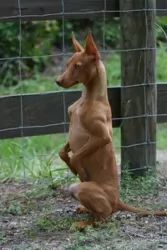 The Podenco Andaluz hails from the Andalusian region of southern Spain. It is believed that this dog is likely to have descended from the European hunting dog.
The Podenco Andaluz hails from the Andalusian region of southern Spain. It is believed that this dog is likely to have descended from the European hunting dog.
Because of the lack of distinctive characteristics, and also the similarities the dog shares with other dog breeds, the dog isn’t typically recognized in its own right. They have always been used as hunting dogs. The Andaluz is actually one of the lesser known Podencos and it isn’t recognized by the FCI.
The Molossus has always been a popular dog and they have been around since ancient times. Mastiff type dogs are termed as Molossus.
Of course, when looking at the origin of the dog, there are many unsubstantiated claims about it. It has always been believed that the Molossus was a Mastiff-type dog, ferocious in battle. The Romans were dog breeders and recognized that the Molossus was a talented dog – good at guarding and herding.
Over the centuries the dog has changed but it is believed it was a Mastiff-type dog with a number of other breeds included in its origins such as the Rottweiler, Pug, Bulldog, Great Dane, Alano Espanol and Saint Bernard.
The Molossus isn’t a dog breed itself but rather a category that other dogs belong to. Today there are Molosser clubs and Molosser shows around the world.
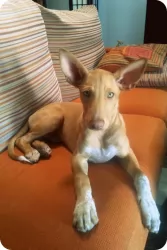 There are three different Andalusian Hounds - small, medium and large, but for the sake of space, we refer to the medium sized dog. The medium sized dog stands at between 42 and 53cm and weighs roughly 20 – 22kg.
There are three different Andalusian Hounds - small, medium and large, but for the sake of space, we refer to the medium sized dog. The medium sized dog stands at between 42 and 53cm and weighs roughly 20 – 22kg.
The dog has short hair, large erect ears and a long tail. Regarding color, most of these dogs are a reddish brown or plain brown color with some having patches of white.
The Andaluz is a dog which is reserved with strangers, but with their owners they are loyal and loving and never aggressive. The Andaluz is considered a one-man dog but he is more than capable of showing love and affection for all members of his human family.
This dog will benefit from training and socialization as this makes him more sure of himself and more obedient. He is an intelligent dog and won’t battle to learn simple commands. You’ll find your Podenco Andaluz to be sweet, calm and gentle indoors with training. He loves to lie close up to you,preferably on the couch right next to you!
This Ancient dog breed from Greece has different descriptions of what it really looked like. It seems to have always been large to medium sized dog standing in the region of 50 to 76cm in height and weighing anything from 25 to 55kg.
The coat is mostly short and smooth and can be in a host of different colors. They are large boned dogs, solidly built with medium sized floppy ears, a short, thick neck, short, broad muzzle and a long tail which was later docked.
Molossers typically have heavy bones, pendant ears, and a relatively short and well-muscled neck, with a short, broad muzzle. These Molossers have always been used for a variety of jobs where strength, perseverance, speed and braveness are required. They have been used as rescue- and guard dogs, protecting livestock from predators.
The Molossus dogs all have the same kind of characteristics which have been bred into them. From their working days, they are known for their tremendous courage, taking on wild animals to protect their livestock.
They are territorial, wanting to protect their human family and home from intruders.They have also been bred to be loyal, loving family pets, and being highly affectionate, they want to be involved in the activities of the family.
This breed is gentle and loving, social and active and gets on well with other pets in the home as well as with children. They’re intelligent dogs and will need to be trained and socialized to ensure they are obedient and amicable with visitors to the home.
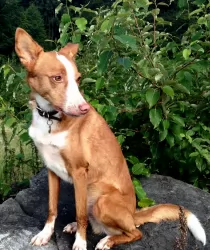 This dog has always been a hunting dog, and an excellent one at that. These days he is also a companion animal. It is very sad that these dogs have been given a cruel deal in Spain.
This dog has always been a hunting dog, and an excellent one at that. These days he is also a companion animal. It is very sad that these dogs have been given a cruel deal in Spain.
For those that make it into a loving home, they have proved to make excellent low maintenance dogs who are willing to provide their human family with faithful love and companionship that only a dog can provide.
The Molossus, contrary to what many people think, isn’t a vicious dog, but rather a good natured dog that makes a wonderful family pet.
These dogs are known also for being hard working dogs with characteristics of bravery. They are dogs who may look fairly tough, but they are actually gentle, calm and sensitive. It’s a bad upbringing from the owners that gives any dog bad characteristics.
Train your Molossus, have him socialized and be a responsible and loving dog owner, and these dogs promise to make you a splendid family pet.
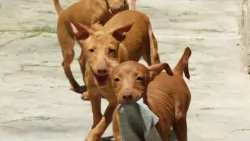 Your Podenco Andaluz is a robust dog breed and doesn’t battle with any health conditions. However, having said that, every dog can battle with some of the more common dog illnesses, and then your dog may well have to visit the vet.
Your Podenco Andaluz is a robust dog breed and doesn’t battle with any health conditions. However, having said that, every dog can battle with some of the more common dog illnesses, and then your dog may well have to visit the vet.
Remember, that to give your dog the best chance, the dog should receive vaccinations to protect him from some life-threatening diseases.
This disease is brought about by the protozoan parasite Leishmania. The dog gets into trouble with this disease when sand-flies transmit parasites into the skin of the dog. The disease spreads to most organs, with kidney failure being the most common cause of death.
This is a fatal disease that is contracted through the bite of an infected mosquito. It is serious and will require veterinary intervention as its a disease that can create problems with the animal’s heart.
This is a fatal viral disease that can be passed on to your pet and affects the central nervous system. A dog with rabies is nearly always a dead dog, sadly. Symptoms include excess drooling, aggression and seizures.
These large dogs are particularly prone to health issues such as hip dysplasia, a genetic condition. A poor diet as well as environmental factors can contribute towards the disease too as well as rapid weight gain and obesity.
This disease develops because the dog’s hip joints haven’t developed properly. The hips then partially dislocate, and the dog has pain and battles to get around. If your dog shows signs of hip dysplasia, he will need to get to the vet to do a physical exam and come up with a treatment- and management program.
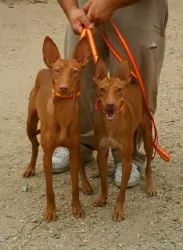 This has always been a hunting dog so he is used to running long distances. He is best suited to life in the countryside as opposed to life on a small property in the city. You will certainly need to take him on walks. If you are lucky enough to live near the beach, you can take bat and ball and hit the ball hard with the beach-bat, allowing your dog to race at top speed to fetch it.
This has always been a hunting dog so he is used to running long distances. He is best suited to life in the countryside as opposed to life on a small property in the city. You will certainly need to take him on walks. If you are lucky enough to live near the beach, you can take bat and ball and hit the ball hard with the beach-bat, allowing your dog to race at top speed to fetch it.
Regular brushing, at least twice a week will be required for the Podenco Andaluz. It’s a good idea to check your dog over for any odd lumps and for ticks and fleas. Keep his nails trimmed and check his ears and eyes for infection.
Every dog requires a good diet if good health and longevity are to be expected. Always check the labels of commercially manufactured dog foods to ensure that your dog gets a good dose of protein in.
The best quality foods have a good balance of vitamins and minerals in them, whereas some of the poorer quality foods have bad ingredients such as preservative, colorants and fillers.
Try and give your dog some wholesome home-made food such as boiled chicken, brown rice or pasta, sweet potatoes, spinach and carrots. Also, some raw meat occasionally will benefit your dog too, after all dogs have always been carnivores.
These dogs were bred to be working dogs and they have always spent their time outdoors performing a guarding or rescue role. Today they require a lot of exercise – walks and ball games – as they are dogs with a lot of energy.
Essentially a large breed, the Molossus will need a commercially manufactured food of high quality if you opt to make use of the convenience of these foods.
Make sure to choose one manufactured for large breeds and which is free of a host of bad ingredients such as corn, soy, wheat, dairy, artificial colors, sweeteners and preservatives.
You want dog food which is high in protein and fat. Try and include some home-cooked food such as boiled chicken, brown rice, pasta and vegetables. An ingredient to look out for in your dog’s food is omega-3 fatty acid to help keep the skin and coat shiny and healthy. Puppies particularly benefit from DHA, or Docosahexaenoic acid, a form of omega-3 fatty acid that is good for brain development.
Brushing the dog’s coat twice a week will be necessary to remove loose hairs, especially during the shedding period. When you brush him, check for ticks and fleas and speak to your vet about flea treatment if necessary. Ears and eyes should be checked and cleaned regularly.